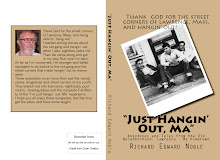The Hobo PhilosopherSOCIALISMby Richard E NobleI’ve lived in the South now for about the last twenty-five years or so. I’ve lived up in ‘Yankee’ territory for an equal number of years. In any case, I don’t ever remember hearing so much talk about Socialism as I have in the last few years. I don’t know if this is a new topic in both the North and the South but, regardless, I find the whole dialogue rather interesting.
I live in Florida - the southern part of Florida, which, as all of us Floridians know, is the northern panhandle. Southern Florida is where all them damn Yankees live. All us rebels are hiding up here in Tallahassee, and Apalachicola. Every time I pick up a newspaper in this neighborhood, somebody is screaming about Socialism. To tell you the truth, I really don’t think that most folks down here know what Socialism actually is. But from what I see in the papers and the letters to the editor, it seems to be something between pagan devil worship and Adolf Hitler. In any case, it is a very bad thing. And I hear about how bad it is from both rich and poor. It is the enemy of freedom. It’s the antithesis of individualism. It’s mediocrity in the work place. It’s ... why it’s ah, prostitution and selling drugs to children; and it is everywhere and it’s right here - right here in this little town where I live in the Florida panhandle.
Boy, this is scary! But when I analyze this little Panhandle community I now call home, I find all this talk somewhat confusing.
I live in what most would call a poor community - traditionally, very poor. Many folks around here are on what they call - disability. From what I can gather, most of them think that getting disability is like getting an inheritance from some long lost relative, or winning the lottery. At best, they think it to be an early age retirement program of some kind. Now I don’t mean to scare all of you folks downtown but that check that you are getting comes from the state. Now don’t run out and tell this to all of your independent Capitalist friends and neighbors, but you are participating in an act of SOCIALISM! (Is that a felony or a misdemeanor?)
Other poor Capitalists in this community, buy their groceries with food stamps, or they used to. That’s a big RED Socialist no no, my good friends.
Like a lot of children in this community, my mother raised me from age thirteen to age eighteen on a widower’s pension. Sorry kids - single mommies and daddies - you’ve just been Socialized! (That’s kind of like getting ‘slimmed’ I think.) Then again, if you are on ADC (Aid to Dependent Children) you didn’t even have to become a widow, or even get married, and you got all of us good capitalists sending money to support you and your little bastards. [Bastard = a child born out of wedlock.] This may sound strange to all of you young women today, but back in the ‘old’ days a woman used to be ashamed to have a baby without first getting married - and married to a MAN. How chauvinistic! Can you imagine? I certainly hope that our society doesn’t regress to such male-dominated, anti-liberated, freedom inhibiting, antiquated standards such as the above ever again.
Interestingly enough, the biggest single employer in this area is the ... government. Nearly anybody who is anybody around "these parts” is a retired General or Admiral from the Military service. Sorry guys and gals but MILITARY (American flags and all) means employed by the state - means salaries coming out of taxpayers dollars. From the good capitalist point of view, your service and wounds all aside, any of us good capitalists would have done whatever it is that you think you did, if we were ‘called’. Even our current president ( Bush) supports that notion. Besides, why do you people all think that you should get a check for the rest of your life for just doing what you were supposed to do in the first place? Yours was not exactly a sacrifice. It was your DUTY, not to mention a steady job and the paycheck you got for all those hours of sitting around on your ass and doing nothing in peace time. (Capitalist point of view - not the author’s). What about all of those extra coffee breaks and the free board and room supplied by us ‘capitalist’ taxpayers, for all of those years when nobody was shooting? Talk about sucking the system dry! (Ps: that was a conservative talking, not me.) Besides, you certainly couldn’t get more Socialistic than the all-for-one one-for-all military. If it ain’t Socialist, it is outright Communist. You don’t even get your “inalienable” rights when you’re in the Military. They decided that your Constitution and the Military are not compatible. You can’t have a democratic Military, for God’s sake.
The last prominent group here in my little town, are “good old boys” who left the farm, went to the big city, and have since retired from some union job. Well I don’t know if you would call ‘unions’ socialist ... you might like the word communist better. In case you have never noticed, the words worker and capitalist are not exactly synonyms. The whole socialist/communist movement in America was the brainchild of unionism. Workers are supposed to negotiate separately. Ganging up on the boss is not fair. What chance do the poor bosses have? It was the labor unions who were the first to be prosecuted under the anti-monopolistic Sherman Anti-Trust Act - it was not the big business Robber Barons, you know.
Workers joining together for better working conditions and better wages was against the law in this country right up until the Franklin Roosevelt administration. Before that, it was considered a conspiracy in restraint of trade and against the property rights of the bosses. It was unconstitutional.
And I hate to tell you this but “retirement” is no capitalist idea. You can bet your child labor laws that no red-blooded, American capitalist ever thought up the ridiculous idea of starting up a RETIREMENT FUND for lazy employees who think that they are too old to work - not without being pressured in one way or another by some Socialist/Communist union anyway.
What are you people crazy!!? Get your butts off them lawn chairs and get a damn job. As a famous ex-capitalist once said, let me make myself perfectly clear:
If you work for the State - pssstt don’t tell anybody, but you are engaged in a Socialist enterprise. And if you don’t like this arrangement, you can write to your congressman - but don’t mail it, because you certainly wouldn’t want to encourage that Socialistic postal system. Post office ... of the state, by the state and for the state.
If you are retired from some union, you’re not even good enough to be a Socialist, you’re a damn Communist and you know it! Everybody has known for decades that labor unions are Marxist, and that’s even worse than Socialist.
If you are retired from the Military you are just adding insult to injury. You had better just crawl up under your bed, my friend, because there is absolutely nothing democratic about the Marine Corps. As a soldier, not only are you a damn government employee Socialist, but you are also an active member of a right wing, radical, totalitarian organization - that kills people! No doubt about it, when you join the United States Military, you have just moved to another country. A country in which every dictator in the world would feel very much at home.
If you tell the Admiral that you wouldn’t follow his sorry butt to the latrine for fear that he would pee between the urinals, an you find yourself in the hole, or someplace worse, don’t waste your breath screaming about your Constitutional rights, because “they done gone, boy! We don’t have no Constitution he-ahh boy. And we don’t have no IN-DI-VID-U-ALS neither. You get me BOY!”
If you are one of those who are complaining about living on a fixed income, and you want your COLA’s increased, you had best not fight for the abolition of Socialism here at home, because when they cancel your Socialist Social Security check, you will probably find yourself bagging groceries at your local ‘Hop and Stop’ in your new (bought with your own hard earned damn money) capitalistic, secondhand wheelchair.
Have you been to the hospital recently? Better check your Medicare. Whoops Medicare? Was that a capitalist program started by Henry Ford? You can bet your mass production, assembly line, sixteen hour day that it wasn’t, it isn’t, and it never will be.
You are out of work, and your unemployment checks are running out? Go talk to your Republican (I’m a capitalist) Senator, or Mr. Conservative (buy some bigger boot straps) news commentator, or newspaper editorialist, or rich radio talk show host. Unemployment checks? Why the newspapers are full of jobs. Turn in that Socialist government check and get a damn job. You probably belong to some damn union too. Socialist PIG!!
Speaking of pigs, do you work for the police department? the fire department? the Marine patrol? That’s all state employment. A no-no in a free capitalist society. By the way, do you work for the health department? the driver’s licensing burrow? the DNR?, the IRS? Urban renewal? the environmental protection agency, the J.P.T.A. (that’s Government funded, boys and girls) you’ve just been slimmed.
Did the boss give you a bucket of acid, instead of water and now you are collecting workmen’s compensation? Hang your head, my friend. Turn in that check, and get a job.
You’re receiving a Veteran’s check? A capitalist idea? I think not, Comrade! Turn it in! Get a job!
Your retirement is secure. You’re vested, you say. Another Henry Ford idea? Not hardly - Socialism, good buddy.
Is your book over due at the public library? Do you work at the public library? For God’s sake, become a capitalist and buy your own darn books, will you! Why should good capitalists like us pay out our hard earned dollars for books so that parasites like you can read for free? There is no free lunch, or book of the month, for that matter.
So you have a nephew who is a Forest Ranger? Your cousin works at a National Park - a STATE park? You enjoy having the family reunion at the COUNTY Park. Why don’t you and your Socialist-commie family celebrate in your own damn back yard, like all us good capitalists do. My God!!!
Are you a little behind on your college loan? Did you get your education through the GI bill? Are you in business due to a minority grant? Do you work at the Public Defenders office? Are you a Public Defender? Capitalist idea? In your dreams baby. Late for the PTA meeting at your neighborhood “public” school? Boy who thought up that tax gouger? Not an independent capitalist, that’s for sure.
Your Mom was a school teacher? Did she start her own school, and charge the neighborhood kids, like a good capitalist? Or did she teach at one of those pinko public institutions? I suppose that she belonged to one of those commie teacher’s union and is now retired and receiving her teacher’s pension check ... RIGHT ALONG WITH HER SOCIALIST SECURITY CHECK. Damn, what’s a good capitalist supposed to do?
A COUNTY hospital? Who the Hell is paying for that? State asylums? You have a COUNTY job? You work for the Federal prison system? the STATE prison system? the County jail?
Had your hospital bills paid by an Insurance Company? Work for an Insurance Company? Own an Insurance Company? The very idea of “insurance” is SOCIALIST or Communist inspired. Unions and worker fraternal organizations thought up that one. Today’s independent insurance company thought up how to take the not-for-profit union idea and turn it into billions for themselves. In the Capitalist world everybody takes care of themselves. They don’t “chip in” and share the load like a bunch of old time Communist Christians. Oh Yes, Yes Yes Yes - Christianity, original design’? Pure Communism.
You like the idea, “all for one, and one for all.” That is Socialism, MAN!
Love your neighbor as yourself? Don’t meditate on that too, too long you commie, socialist, pig!
Insurance is Socialist. The Capitalist part comes in when the owner of the insurance company claims bankruptcy, absconds with the employee’s retirement fund, or simply refuses to pay because your claim is too high, or too many of you “poor victims” have all claimed at the same time. That’s called “Laissez Faire”, pursuing one’s personal self-interest, or as any good Capitalist might say; Screw the woman and children, it’s every man for himself.
Had a disaster recently? One of them nice folks from the SBA or FEMA drop by? Give you a little money, did they? You’re employed by the SBA? Come on?! Have a little capitalistic pride. Turn the damn money in, and get a real job, man!
Just retired from running your own business all your life? Going to take your Socialist Security check and move into the government subsidized rent controlled apartment complex?
You know, before ya’ll start screaming “Socialist”, you had best scope out that signature on your own paycheck. It may be that you used to hate them, but now you is them. But please don’t blame me. I went to a for-pay private school to learn all of this, unlike most of you public school commies. And we weren’t chartered, either. You like Charter schools? Slimmed again.
Do we have to count the fact that my mother paid for my private education with her public Socialist Widow’s Pension?...Naa.
Hey, I think I have a new word. If not a pure-capitalist. I'm a rationalized-capitalist. (I certainly wouldn’t want to be an impure-capitalist.) A rationalized Capitalist - that’s kind of like a liberated-housewife, or a Baptist freethinker or a Southern Democrat.
PS: If you are employed by the Federal Reserve you should be intelligent enough to know that you are a Socialist. In fact, if you work in a bank – any bank – you are a Socialist. You are working for a Socialist organization. It is a perverse Socialist organization, I must admit, since only its failures are Socialized – the Savings and Loan fiasco followed by the Commercial banking failure. As long as banks are profitable they keep their profits. It is only when they go under that Socialism takes over. The Banking industry was bailed out by the American Taxpayer in the largest bank Collapse in World history. And they received this kindness with no payback required – no workfare for the wealthy bankers. It’s below their dignity, I suppose.
If you work for an insurance company – large insurance company – you have pretty much the same deal. When the profits are high the Insurance Company keeps them but when they become marginal the State or the Federal Government takes over – that’s us, the taxpayers.
Interesting to note; statistically the great majority of us do not get seriously ill until we reach 65. It is at this age that everybody is turned over to the Government Medicare System. Which means, that when the odds are good and the profits high the “Capitalist” Insurance Companies keep the profits, but when the pay-outs start, us Socialists take over? What a deal! Once again – no paybacks are required. We Socialist pick up the bill for the Insurance companies for free.
Railroads and Airplanes are also federally subsidized, along with farmers, tobacco growers and any large corporation that is deemed as “too big to fail”. We may inherit the entire pension plans of all of America’s past Corporate Giants – Ford, General Motors – whoever decides that they aren’t going to pay in the future.
It is interesting to note that Socialism has always been used to bail out Capitalist failures – the biggest contrived disaster in 1929 - But these Socialist activities are only ridiculed when they go to the poor or the workers, or the population at large. As long as these Socialists practices go to the wealthy, the Corporate Giants – even to the World Bank and the IMF, we hear not a peep from Congress or anybody else for that matter. By the way, when any bank in the WORLD has a problem – you’re going to bail it out, whether you want to or not.
Isn’t it time that us Socialists smartened up? If we are going to bail everybody out, back everybody up, take over their obligations and promises, subsidize, and finance the whole world – even our enemies - why don’t we, the general public, get a piece of the action WHERE’S THE MONEY! Where’s our money.








































